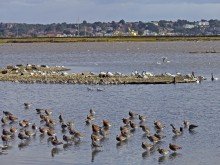Dorset Wildlife Trust’s campaign to raise awareness of the dangers of using bird apps on nature reserves has received phenomenal national and international media coverage.
The bird app story has captured the attention of the world and bird app developers alike, helping us to spread the word that using bird apps to get the attention of protected birds during the nesting season is not only illegal in some cases, but could affect the behaviour of the birds.
Bird App developers, Isoperla (creators of Birds of the British Isles Bird Song) and iSpiny (creators of Chirp!Bird Song of Britain and Europe) have now updated their software to display a warning about the use of their product on nature reserves.
Hilary Wilson from app company iSpiny said: “We know from talking to our customers that they would not deliberately harm birds in any way, and would be upset if they unknowingly did so. To prevent this happening we are adding a warning in the app, explaining that it should not be used audibly near rare or nesting birds, and the customer will have to agree before continuing. We are confident that our customers will welcome this commitment to the welfare of birds.”
Mark Haley from app developer Isoperla Ltd said: “As developers it’s not always easy to predict how people will use our apps, particularly as mobile technology is quite new. We have a huge amount of respect for the Wildlife Trusts, and when we heard that Dorset Wildlife Trust had concerns over the playing of bird songs on reserves, we thought it would be good to try and find a solution by displaying a warning to users.”
The issue was raised by wardens on Brownsea Island who had seen visitors using apps to imitate the distinctive call of the Nightjar, in order to get a closer photograph. Brownsea Island has ‘Special Protection Area’ (SPA) status, and the Nightjar is protected under Annexe 1 of the EU Birds Directive, and Appendix 2 of the Bern Convention.
By using these apps, the territorial and fragile Nightjar could be distracted from important duties of feeding its young whilst it investigates a potential threat, leaving them vulnerable to attack from other predators.
Chris Thain, Manager of the DWT Brownsea Island nature reserve said: “We are so pleased with the public support to our campaign. It shows that people really do care about wildlife. Whilst we recognise value of bird song apps as an educational and fun tool for people to connect with nature, we urge visitors to our nature reserves to put the needs of nesting birds first.”
Brownsea Island is owned by the National Trust and DWT lease and manages the nature reserve.
Claire Dixon, Visitor Services & Enterprises Manager for the National Trust said: “The amazing and rare birdlife on Brownsea Island is a very special part of our offer for visitors. We are always excited by the ways that children and adults can learn about nature, often using technology in new and innovating ways. It is also important that we ensure these tools are used in the right way, to support the conservation work that protects wildlife and ensures future generations can continue to access and enjoy these incredible habitats.”







